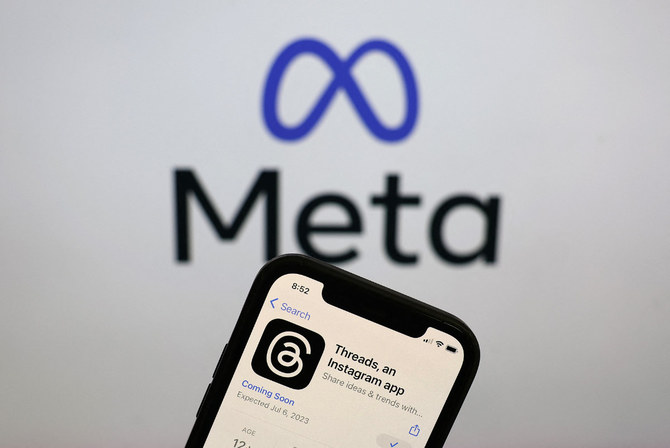WASHINGTON/LONDON: Ten million users have signed up to Threads, Meta’s newly launched social media platform and rival to Twitter, less than a day after its launch, CEO Mark Zuckerberg said Thursday.
“10 million sign ups in seven hours,” Zuckerberg wrote on his official Threads account.
The new offering is billed as a text-based version of Meta’s photo-sharing app Instagram that the company says provides “a new, separate space for real-time updates and public conversations.”
The app is live in Apple and Google Android app stores in more than 100 countries including the US, Britain, Australia, Canada and Japan.
Users will get a Twitter-like microblogging experience, according to screenshots provided to media, suggesting that Meta Platforms has been gearing up to directly challenge the platform after Musk’s tumultuous ownership has resulted in a series of unpopular changes that have turned off users and advertisers.
There are buttons to like, repost, reply to or quote a “thread,” and counters showing the number of likes and replies that a post has received.
“Our vision is that Threads will be a new app more focused on text and dialogue, modeled after what Instagram has done for photo and video,” the company said.
Posts are limited to 500 characters, which is more than Twitter’s 280-character threshold, and can include links, photos and videos up to five minutes long.
Instagram users will be able to log in with their existing user names and follow the same accounts on the new app. New users will have to set up an Instagram account.
Meta emphasized measures to keep users safe, including enforcing Instagram’s community guidelines and providing tools to control who can mention or reply to users.
Meta’s new offering, however, has raised data privacy concerns.
Threads could collect a wide range of personal information, including health, financial, contacts, browsing and search history, location data, purchases and “sensitive info,” according to its data privacy disclosure on the App Store.
Twitter co-founder Jack Dorsey pointed it out in a snarky tweet saying, “All your Threads are belong to us” that included a screenshot of the disclosure. Musk replied “yeah.”
One place Threads won’t be rolled out is in the European Union, which has strict data privacy rules.
Meta has informed Ireland’s Data Privacy Commission that it has no plans yet to launch Threads in the 27-nation bloc, commission spokesman Graham Doyle said. The Irish watchdog is Meta’s main privacy regulator for the EU because the company’s regional headquarters is based in Dublin.
While Meta had teased Threads with a listing on Apple’s UK App Store earlier this week, it could not be found in the French, German or Dutch versions. The company is working on rolling the app out to more countries, but cites regulatory uncertainty for its decision to hold off on a European launch.
Analysts said its success is far from guaranteed, citing Meta’s track record of starting up standalone apps that were later shut down.
Also in question is whether it’s the right move for Meta, which has announced tens of thousands of layoffs over the past year amid a tech industry slowdown.
CEO Mark Zuckerberg also has been focusing on the metaverse, investing tens of billions of dollars in the virtual reality concept.
Meta risks “spreading itself too thin,” said Mike Proulx, a research director at Forrester, a global market research company. “Meta is banking on a moment in time amidst peak Twitter frustration. However, this window of opportunity is already flooded with Twitter alternatives including Bluesky, Mastodon, Spill, Post.News and Hive, which are all competing for Twitter’s market share.”
Even so, Threads could be a fresh headache for Musk, who acquired Twitter last year for $44 billion.
He’s made a series of changes that have triggered backlash, the latest being daily limits on the number of tweets people can view to try to stop unauthorized scraping of potentially valuable data. He also is now requiring paid verification for users to access the online dashboard TweetDeck.
Musk’s rivalry with Zuckerberg could end up spilling over into real life. In an online exchange the two tech billionaires seemingly agreed to a cage match face-off, though it’s unclear if they will actually make it to the ring.




























